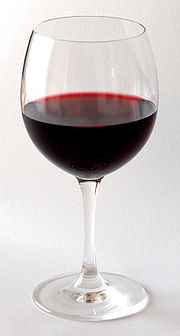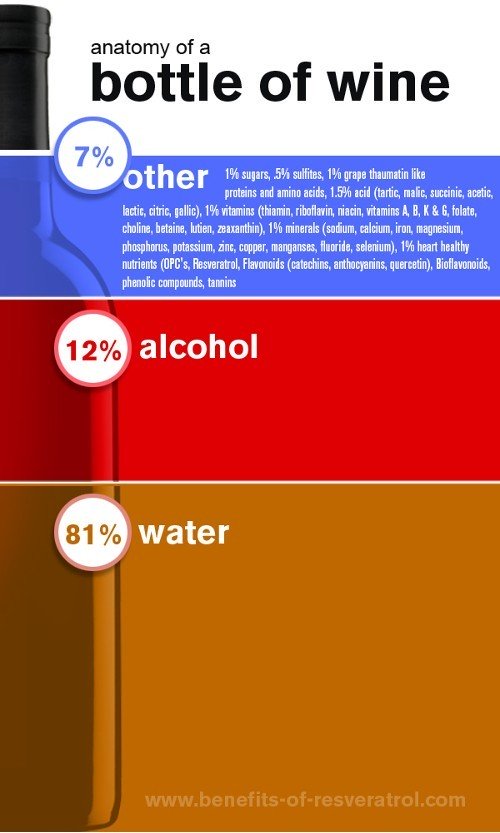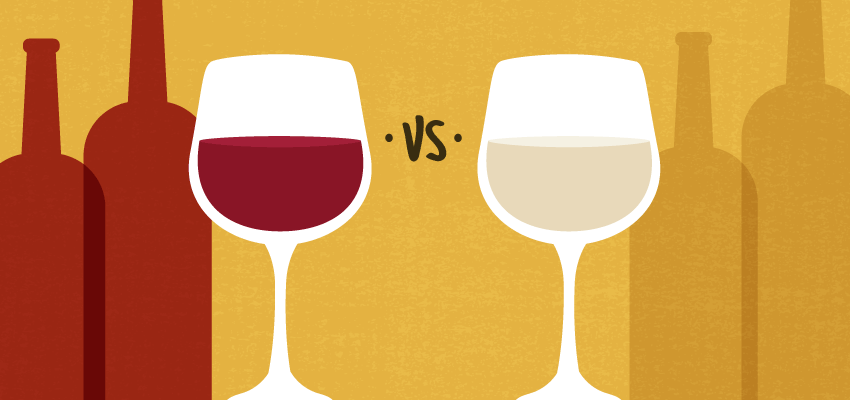We have been hearing for years that there are wonderful health benefits of drinking wine, specifically red wine. Taken in moderation, as all the studies report, the red wine benefits can dramatically improve your health.
Since 1991 there have been hundreds of reports providing strong evidence proving the health benefits of drinking red wine.
Most studies suggest two 4-ounce glasses per day is enough to lower the risk of heart attack, lower the amount of cholesterol in the blood, decrease the risk of heart disease and even decrease the risk of some forms of cancer.
While the “French Paradox” is just a theory, it’s no theory that the wine-loving French suffer 1/3rd the heart attacks we do in America.
Wine can improve digestion, promote relaxation and helps foster a good mood. Another of the red wine health benefits is wine’s ability to increase the body’s absorption of calcium, magnesium, phosphorus and zinc.
All these important minerals help prevent osteoporosis – another great red wine benefit. Red wine also contains iron, a necessary mineral for oxygen transport in the body. Thus drinking red wine helps deliver the iron necessary (10 mg per day for men, 15 mg per day for women) and it’s non-heme iron, which is different than the kind in meat (and Cheerios.)
The April 2009 Issue of the American Journal of Clinical Nutrition conducted a study of 2,700 people and their alcohol habits. What they found was that men who had one to two drinks per day had 4 percent more bone density than those who had none. Women had 5 to 8 percent denser bones. Beyond two glasses a day though, the bone strength diminished. The study also proved that beer and wine far outweighed the benefits of other alchohol.
What Makes Wine Healthy?
The health benefits of drinking wine come from the chemical makeup of the wine, not necessarily the alcohol. Alcohol is the byproduct of fermentation, which on its own has tremendous health benefits (if taken in moderation of course).
The alcohol itself may help to raise the good cholesterol and inhibit the formation of blood clots. This is called vasodilation, meaning the opening of the blood vessels and increasing blood flow. Alcohol can not be dismissed as one of the health benefits of drinking wine but. . .
The real benefits in red wine are the ingredients derived from the grapes themselves. The best part of the grape is the skin.(I’m sorry to report to you white wine lovers that red wine wins the health contest every time.) Since the skins are used in the process of fermentation, their benefits get absorbed into the red wine.
| Watch author and wine educator, Christine Ansbacher, also known as “The Wine Diva”, on Plum TV talk about the health benefits of drinking wine. The Wine Diva is known for her straight, practical talk about wine. Instead, she shares tips to help regular wine drinkers save money, choose wisely and drink well. |
The skin contains over 400 health-promoting substances like tannins, phenols,flavonoids, bioflovanoids, vitamins, minerals, antioxidants and polyphenols like quercetin, resveratrol, OPC’s and catechins. They all work together to raise the level of HDL cholesterol “good”, and lower the LDL cholesterol “bad”.
Most of these act like antixodiants in the blood. Antioxidants reduce free radicals in the body which cause damage, help create conditions for disease and cause aging. Specifically they donate electrons to “unstable” molecules which are literally bouncing around in your blood putting small pits in your blood vessels and damaging healthy cells. This action alone gives your body opportunity to heal the damage. It is this ‘damage’ that we call the “signs of aging”.
Resveratrol is the king of the red wine health benefits. Also found in the skins of grapes, resveratrol is the antibody the grapes produce when they are fighting disease, fungii or injury. They repair cells, reduce inflation, and act as antioxidants in reversing the aging process. Where free radicals damage healthy cells, which is what causes aged skin, resveratrol not only combats the free radicals but repairs the damaged cells.
The best way to absorb Resveratrol in humans appears to be buccal delivery, that is without swallowing, but by direct absorption through the inside of the mouth. The way wine drinkers swish the wine in their mouth before swallowing is what make the combination so effective.
Flavonoids and bioflavonoids (commonly misspelled flavanoids and bioflavanoids) are really one in the same. Their purpose in plants is to create the blue and yellow pigments in flowers and leaves – but they do so much more. Research has shown them to have both anti-inflammatory, antioxidant and anti-allergy abilities.

Tannins are what give wine its bitter, dry taste and are found in the skin and seeds of the grapes. They are proanthocyanidins (often referred to as OPC’s). Tannins work like antioxidants and prevent hardening of the arteries, and inhibit the growth of plaque on your teeth. Winemakers often go to great lengths to reduce the number of tannins in wine. Press Wine, on the other hand, is extremely high in tannins because the winemakers do not deseed the grapes, but instead press and break the seeds during winemaking.
Finally Quercetin is another pigment in red grapes. Also found in apples, green onions and gree tea, quercetin works as an anti-inflammatory, an antihistamine and an antioxidant. And trials are currently under way to see how quercetin fights off cancer cells.
All together, these ingredients makeup the health benefits of drinking wine. The only thing healthier than adding red wine to your diet is quitting smoking. While white wine does have its benefits, it can not hold a candle to the power grape skins add to the health benefits of drinking wine.
How Much Wine Should I Drink?
To get the health benefits of drinking wine, research shows two 5-ounce (some say 4 ounce) glasses per day to be ideal. The staff at the Mayo Clinic (published on MayoClinic.com) state:
| “If you already drink red wine, do so in moderation. Moderate drinking is defined as an average of two drinks a day for men and one drink a day for women.* A drink is defined as 12 ounces (oz.) of beer, 5 oz. of wine or 1.5 oz. of 80-proof distilled spirits.
The limit for men is higher because men generally weigh more and have more of an enzyme that metabolizes alcohol than women do.” |
However, the problem with wine consumption is the alcohol itself. Exceeding the average wine consumption can lead to alcohol abuse, drug rehab facilities are always an option if advice and help is needed. Too much alchohol and you will have negated the health benefits of drinking wine. Dessert wines like Port Wines and other dessert wines are not only higher in alcohol concentration, but also are higher in sugar calories.
Recently, NBC’s Nancy Snyderman reported that women should drink no more than 3 glasses of alcohol per week. She cited a study in Britain that followed 1.3 million people. The study proved people who had more than 1 drink per day of alcohol had an increased risk of cancer. She then stated it is now believed that 5% of all cancers in women are being linked to alcohol use.
Dr. Naomi Allen of the Oxford University study said the best way to get the health benefits of drinking wine was to use a resveratrol supplement. The ill effects alcohol can cause outweigh the benefits.
Another problem with alcohol is it is high in sugar calories. Red wines have around 85 calories in 4 ounces, white wines have around 100 calories. Dessert wines, wine coolers and sherry are much higher. And the sugar calories are not the kind that make you leaner.
To get the premium health benefits of resveratrol and the other antioxidants, studies suggest you need 500 milligrams per day. Unfortunately, that would be equal to about 500 glasses – thus taking an antioxidant supplement containing resveratrol is recommended – especially for women, according to Nancy Snyderman.
Healthy Alternatives to Alcohol
Not everyone can have alcohol, people with diabetes often avoid it for its high sugar content and sufferers of red wine headache avoid it all together. Those taking anti-coagulants often avoid alcohol because of its blood thinning properties. People with liver disorders and pregnant women should not consume alcohol.
The American Heart Association cautions people not to start drinking alcohol at all because of the detrimental effects it has when drinking too much. Whether for personal, medical or religious reasons there are alternative ways to get the health benefits of drinking wine.
Author: Dan R Morris
Peanuts, supplements, non-alcoholic wines and even teas are great ways to get all the health benefits of drinking with without the alcohol.
Return from Health Benefits of Drinking Wine to the Home Page
A Little Bit Deeper Research
There is so much to learn in the world of resveratrol, antioxidants, superfoods and wine. This is the place to start, no matter what, if you indeed are looking to maximize your health and live longer.
 |
Chemical Composition of Wine This chemical composition of wine graphic doesn’t represent every wine, but was put together as a baseline of what’s in wine. |
 |
Resveratrol Enhanced Wine Reportedly there are nine wineries in the Rioja province in Spain also looking to make resveratrol enhanced wines. |
 |
Health Benefits of White Wine There are different types of antioxidant molecules and the antioxidants found in white wine actually has increased beneficial effects on the health than those found in red. |
 |
Are Red Wine Headaches About Sulfites? Maybe Sulfites aren’t the only reason red wine gives headaches. |
 |
What Are the Healthiest Wines? Determining the healthiest wines is not so hard if you look at one aspect at a time. |